Did you know that baby robins can be fed up to 150 meals a day by their devoted parents? The average duration for birds to feed their young is an impressive two and a half to four weeks, with some species like swifts continuing this care for up to eight weeks. This remarkable dedication highlights the importance of proper nutrition for the growth and development of baby birds.
Baby birds primarily consume insects for energy, with fruits and vegetables forming a part of their diet as well. Understanding the specific dietary needs of young birds is crucial for ensuring they receive the necessary nourishment to thrive. From the types of food they require to the proper feeding techniques, this guide will explore everything you need to know about caring for baby birds.
Key Takeaways
- Baby birds require a specialized diet to grow and thrive, with their dietary needs varying by age and species.
- Newborn or nestling birds rely on their parents to feed them a diet of insects, worms, and other protein-rich foods.
- As baby birds mature into fledglings, their diet may transition to include more plant-based foods like seeds and fruits.
- Providing the proper nutrition is crucial for ensuring baby birds develop strong and healthy.
- Avoiding certain foods, such as cow’s milk, and seeking professional help when necessary are essential for the well-being of baby birds.
Introduction to Feeding Baby Birds
Caring for baby birds can be a delicate and rewarding task. These feathered hatchlings have unique dietary requirements that differ significantly from adult birds. Properly understanding the nutritional needs of baby birds, from newborns to fledglings, is crucial to ensuring their growth and development. This article will explore the various types of foods baby birds consume, the right feeding techniques, and when to seek professional help for orphaned or injured chicks.
Baby birds, like all young animals, require a carefully balanced diet to thrive. Studies show that 96% of terrestrial birds feed their nestlings insects, not berries or seeds. Raising a clutch of even a small species like a chickadee can require thousands of caterpillars. Additionally, 90% of caterpillars need native plants, indicating that suburban landscapes with non-native plants may not support many birds.
Some bird parents even go so far as to carry their babies’ fecal sacs in their beaks and even consume the waste produced by hatchlings. This is a testament to the intense nutritional needs of these young birds. Unfortunately, the cutting down of mature native trees in neighborhoods has removed a vital source of insect food for birds, leaving some species like cardinals desperate for alternative food sources like mealworms to feed their young.
“Trees being cut down in neighborhoods have removed mature native trees that produced insect food for birds for decades.”
Altricial baby birds, which rely entirely on their parents for food, require feeding every half-hour. A mixture of mynah bird pellets or dry dog food soaked in hot water, combined with baby food, turkey, cooked egg yolk, and water, can provide adequate nourishment for most orphaned baby birds. However, it’s crucial not to overfeed them; the goal is to feed only until their crop on the side of their neck appears full.
Interestingly, even fruit-eating birds are typically fed insects during their rapid growth phase. Fledgling birds, with open eyes and emerging feathers, should be encouraged to eat natural foods and be placed in a larger area with perches. Precocial birds, such as ducks, geese, and turkeys, require chick or turkey starter food and a heat lamp when very young, and should not be allowed to swim until their downy feathers are replaced with adult feathers.
Identifying if a Baby Bird Needs Help
Seeing a baby bird hopping around on its own can be a common sight in the spring and summer. These fully feathered young birds, known as fledglings, are simply going through a normal stage of their development as they build strength before learning to fly. On the other hand, nestlings are very young birds that are still bald or covered in fluffy down. If a nestling is found on the ground, it may have fallen from its nest and could require assistance.
Fledglings vs. Nestlings
The key difference between fledglings and nestlings is their level of development. Fledglings are larger, have more feathers, and are able to hop and move around, while nestlings are smaller, less feathered, and typically still in the nest. It’s important to observe the baby bird carefully to determine its stage of development and whether it needs help.
Signs of Injury or Abandonment
- Obvious injuries, such as broken wings or legs
- Lethargy or inability to stand properly
- Lack of parental care for an extended period
If you notice any of these signs, it’s best to contact a wildlife rehabilitation center or your local wildlife agency for guidance. Attempting to care for a baby bird without proper knowledge and skills can do more harm than good.
It’s also important to remember that even if a baby bird appears abandoned, its parents may still be nearby caring for it. Observe the situation carefully before intervening, as unnecessary rescue attempts can interfere with the natural parental care.
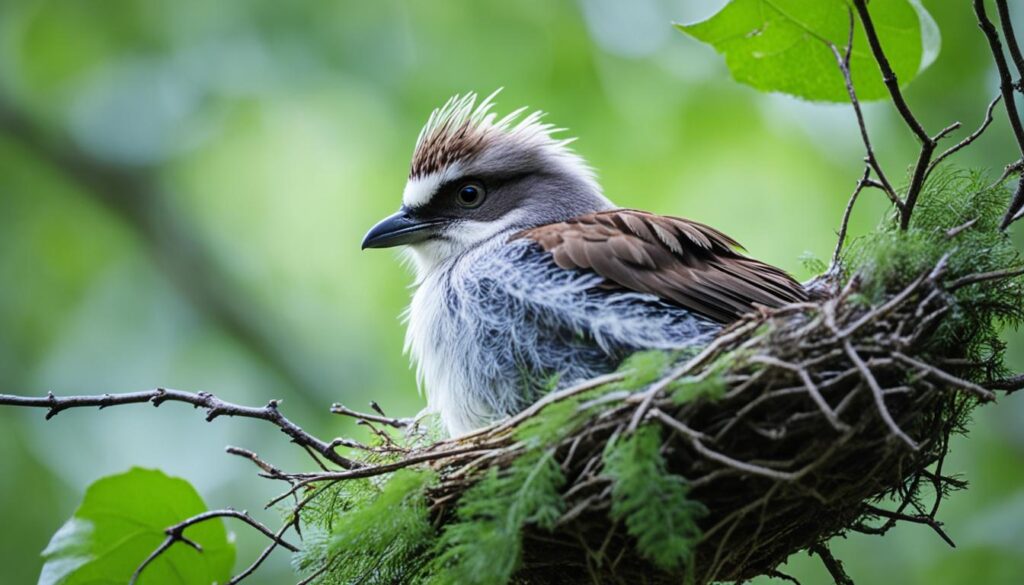
“If the nest was destroyed by a predator or due to hazards like dogs or cats, it is advisable to take the babies to a rehabilitator, indicating potential threats to baby birds’ survival.”
In cases where the nest has been destroyed or the baby bird is in immediate danger, it’s best to contact a wildlife rehabilitation center or your local wildlife agency for assistance. They have the expertise and resources to ensure the baby bird’s well-being.
What Baby Birds Eat in the Wild
In the natural world, baby birds’ diets consist primarily of the same foods their parents consume, including a variety of insects, worms, seeds, and other plant matter. These nutrient-dense items are essential for fueling the rapid growth and development of young birds.
Insects and Protein Sources
Insects and other protein-rich foods make up the majority of a baby bird’s diet. Protein is crucial for supporting their accelerated growth and powering their active lifestyles. Common protein sources include spiders, caterpillars, beetles, and various flying insects that the parent birds capture and deliver to the nest.
Seeds and Plant Matter
As baby birds mature, they may gradually incorporate more plant-based foods like seeds, berries, and other fruits into their diet. These carbohydrate and fiber-rich items help provide well-rounded nutrition and aid in the transition to a more diverse adult diet.
The specific dietary needs of baby birds can vary widely by species, but a balanced diet of insects, worms, and plant matter is generally ideal for supporting their growth and development in the wild.
“A diverse diet of insects, worms, and plant matter is generally ideal for supporting the development of baby birds in the wild.”
Suitable Foods for Orphaned Baby Birds
When caring for an orphaned or injured baby bird, it’s essential to provide a diet that closely mimics what the bird would receive from its parents in the wild. This typically includes a variety of small insects, worms, eggs, and specially-formulated baby bird formula. By offering the appropriate foods, you can help ensure the baby bird’s healthy growth and development.
Insects and Worms
Insects and worms are an excellent source of protein for orphaned baby birds. These small invertebrates can be an essential part of a baby bird’s diet, as they closely resemble the natural prey that the bird would find in its natural habitat. Some suitable options include mealworms, waxworms, crickets, and small earthworms.
Eggs and Protein Supplements
In addition to insects and worms, eggs and protein supplements can also be beneficial for orphaned baby birds. Hard-boiled eggs, scrambled eggs, or egg-based powdered supplements can provide the necessary nutrients for growth and development. These protein-rich foods can be mixed with water or formula to create a nutritious meal for the young birds.
Baby Bird Formula
For orphaned baby birds, specially-formulated baby bird formula is often the best option to ensure they receive a balanced and complete diet. These commercial formulas are designed to meet the unique nutritional needs of young birds, providing the right combination of proteins, fats, and minerals. When preparing the formula, it’s crucial to follow the manufacturer’s instructions carefully to ensure the proper consistency and nutrient content.
Remember, it’s essential to avoid feeding baby birds any foods that could be harmful, such as bread, dairy, or processed human snacks. By providing a diet that closely mimics what the bird would receive from its parents in the wild, you can give the best possible care to an orphaned or injured baby bird.
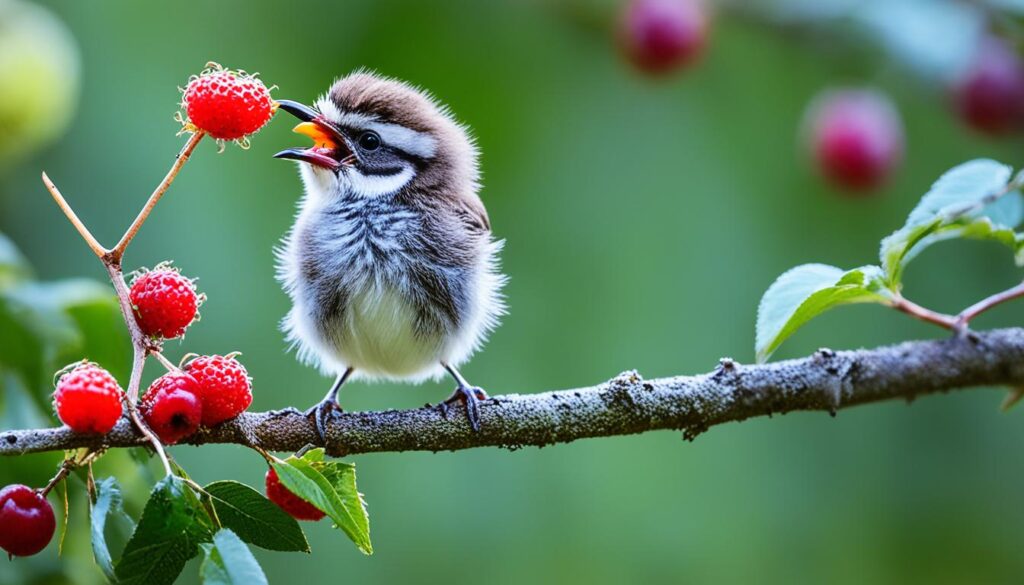
“Proper nutrition is crucial for the survival and development of orphaned baby birds. By offering the right foods, we can give them the best chance at a healthy, successful life.”
Foods to Avoid Feeding Baby Birds
When caring for orphaned or injured baby birds, it’s crucial to understand that their dietary needs differ significantly from those of adult birds. While baby birds have specific nutritional requirements, there are certain foods that should be strictly avoided to ensure their health and well-being.
One common mistake is feeding baby birds bread, potato chips, baked goods, and other human snacks. These types of foods provide little to no nutritional value and can even be harmful to a baby bird’s delicate digestive system. Similarly, offering honey, milk, or raw meat can also be dangerous, as these items can cause gastrointestinal issues or lead to nutritional deficiencies.
“Providing the right diet is essential for the proper growth and development of baby birds. Sticking to a diet of insects, worms, eggs, and specialized baby bird formula is the best way to ensure they receive the proper nutrients.”
Instead, it’s recommended to focus on a diet that consists of insects, worms, eggs, and specialized baby bird formula. These food sources are rich in the proteins, fats, and other essential nutrients that baby birds require to grow strong and healthy.
By avoiding foods that are unsuitable for baby birds and providing a balanced diet, you can help ensure that the young bird in your care receives the proper nutrition to thrive. Consulting with a wildlife rehabilitation center or veterinarian can also be helpful in determining the specific dietary needs of the bird species you are caring for.
Remember, the health and well-being of baby birds should always be the top priority when providing care. By understanding which foods to avoid and which to offer, you can give these young creatures the best possible chance of survival and a successful transition to independence.
what baby birds eat
Baby birds have very specific dietary needs that differ significantly from their adult counterparts. In the wild, the diet of baby birds consists primarily of insects, worms, and other protein-rich foods provided by their parents. As they mature, they gradually incorporate more plant-based foods like seeds and berries into their diet.
When caring for an orphaned or injured baby bird, it’s crucial to mimic this natural diet as closely as possible. This means providing a combination of insects, worms, eggs, and specialized baby bird formula to ensure the bird receives the necessary nutrients for growth and development.
- Baby birds may need to eat intermittently for 12 to 14 hours a day to get enough protein.
- Some baby birds, especially those without feathers, may require specialized baby bird diet formulas or protein supplements for proper nutrition.
- Different species of baby birds may have varying dietary needs.
It’s important to avoid feeding baby birds foods that could be harmful, such as bread, dairy, and processed human snacks. These foods do not meet the specific nutritional requirements of young birds and can be detrimental to their health and development.
“It may take only a few seconds for a mother bird to feed her chicks.”
When caring for an orphaned or injured baby bird, it’s best not to intervene unless the bird appears weak, lethargic, injured, or truly orphaned. Contacting experienced wildlife rehabilitation centers is crucial, as they have the knowledge and resources to provide the proper care and nutrition these delicate creatures need.
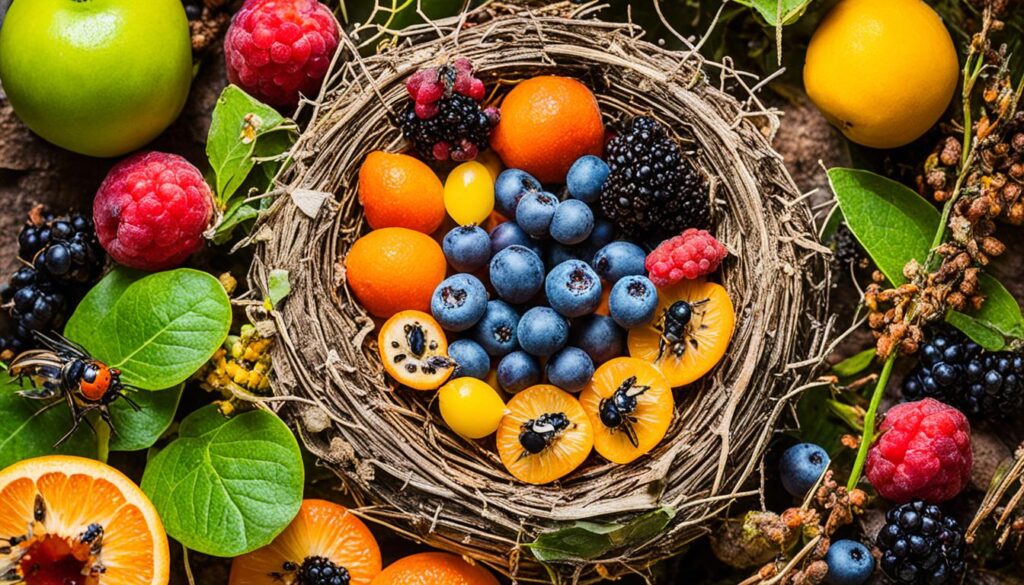
Proper Feeding Techniques
Feeding baby birds requires delicate care and specific techniques to ensure they receive the proper nutrition for their growth and development. When preparing food for these feathered friends, it’s crucial to create soft, bite-sized portions that cater to their underdeveloped beaks and digestive systems.
Preparing Soft, Bite-Sized Portions
Baby birds have tender beaks and sensitive digestive tracts, so their food must be prepared with utmost care. Soft, easily digestible items like mashed insects, pureed eggs, and specially formulated baby bird formula are ideal choices. It’s essential to avoid any hard or large pieces that could potentially cause choking or digestive issues.
Using Feeding Tools Safely
Specialized feeding tools, such as syringes, droppers, and feeding tweezers, can be used to gently deliver the food to baby birds. These tools allow for controlled portion sizes and minimize the risk of injury or distress to the delicate creatures. However, it’s crucial to handle these tools with great care and ensure thorough hand-washing before and after each feeding session to maintain proper hygiene and prevent the spread of diseases.
Proper how to feed baby birds techniques and the use of safe baby bird feeding tools are essential for the well-being and successful rehabilitation of orphaned or injured baby birds. By following these guidelines, you can provide the nourishment they need to grow strong and healthy.
“Feeding baby birds requires a gentle touch and attention to detail to ensure their optimal growth and development.”
Keeping Baby Birds Warm and Safe
Caring for baby birds goes beyond providing the right diet. Ensuring they are kept warm and secure in a safe, nest-like environment is crucial for their well-being. The nesting container should be lined with soft material and positioned in a quiet, draft-free area to mimic their natural habitat.
Nesting Environment
Maintaining the proper temperature, typically around 89.6°F (32°C), is essential for a baby bird’s proper digestion and development. Monitoring the baby bird’s activity and behavior can also help identify any signs of distress or need for additional care. A cozy, protected nesting environment is key to caring for baby birds and ensuring they thrive.
When creating a nesting area for a baby bird, consider the following tips:
- Line the container with soft, natural materials like shredded paper, paper towels, or clean rags to simulate a nest.
- Place the container in a quiet, draft-free area, away from direct sunlight or excessive heat sources.
- Monitor the temperature closely and adjust as needed to maintain the ideal range of 89.6°F (32°C).
- Observe the baby bird’s behavior, such as huddling or shivering, which may indicate the need for additional warmth.
- Avoid handling the baby bird unnecessarily, as this can stress them and disrupt their baby bird nesting environment.
By providing a safe, comfortable, and appropriately heated nesting environment, you can give baby birds the best chance at survival and healthy development. Paying close attention to their needs and monitoring their well-being is crucial when keeping baby birds warm.
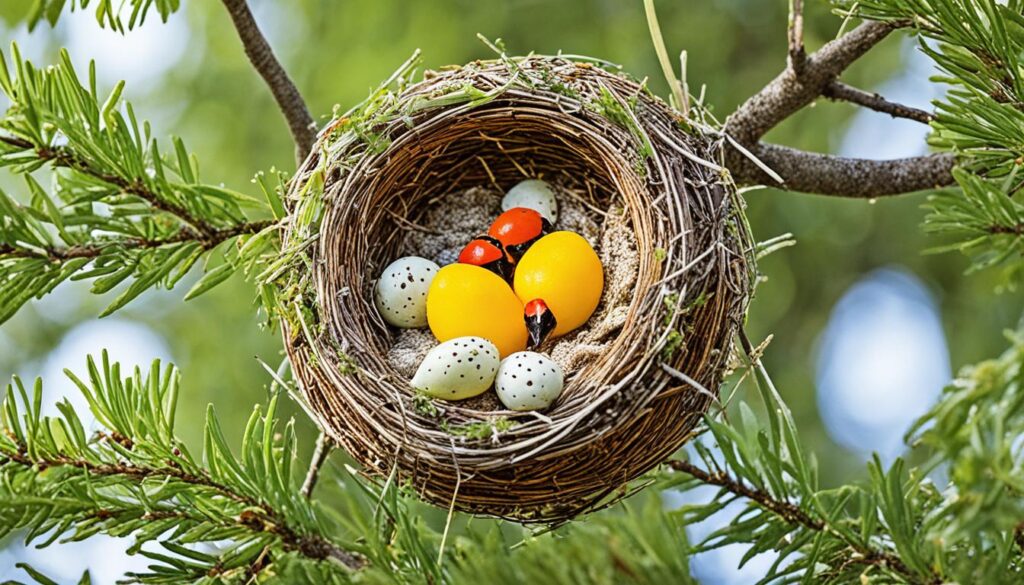
“The key to keeping baby birds alive and thriving is providing them with a warm, secure, and species-appropriate nesting environment.”
Seeking Professional Help
While caring for an orphaned or injured baby bird can be a rewarding experience, it’s crucial to recognize when professional assistance is needed. If a baby bird appears severely ill, injured, or is not thriving despite your best efforts, the responsible course of action is to contact a local wildlife rehabilitation center.
Wildlife Rehabilitation Centers
These specialized facilities are staffed by experts who have the knowledge, resources, and proper licensing to provide the necessary medical care and rehabilitation services. They are equipped to give the baby bird the best chance of survival and successful release back into the wild.
There are several reasons why you should seek help from a wildlife rehabilitation center when caring for a baby bird:
- Proper medical treatment: The staff at these centers have the expertise to diagnose and treat any injuries or illnesses the baby bird may have.
- Specialized diets and feeding techniques: They know precisely what when to seek help for baby birds and how to feed them properly to ensure their optimal growth and development.
- Appropriate housing and environment: Wildlife rehabilitation centers can provide the baby bird with the necessary nesting environment and temperature regulation to keep it safe and comfortable.
- Legal requirements: In many regions, it is illegal for individuals to keep wild animals without the proper permits and licenses, which these centers possess.
By contacting a baby bird rehabilitation center, you can ensure the baby bird receives the best possible care and has the highest chance of being successfully released back into its natural habitat.
“The goal of wildlife rehabilitation is to return healthy animals to the wild. This requires specialized knowledge, skills, and facilities that are not typically available to the average person.”
If you come across a baby bird in need, don’t hesitate to reach out to your local wildlife rehabilitation centers for guidance and assistance. They are the experts in providing the care and support these vulnerable creatures require.
Species-Specific Diets
The dietary needs of baby birds can vary significantly depending on their species. Understanding the species-specific requirements is crucial for providing the proper nutrition to ensure their healthy growth and development.
Songbirds
Baby songbirds often require a diet high in insects and worms, which can make up 80% to 100% of their intake. This protein-rich food source is essential for their rapid growth. To supplement the insect-based diet, songbird nestlings also benefit from soft, cooked eggs and specialized baby bird formula.
Pigeons and Doves
In contrast, baby pigeons and doves may do well on a diet consisting primarily of a mixture of instant baby oatmeal, powdered parrot food, and raw, beaten eggs. This balanced blend provides the necessary nutrients for these young birds to thrive.
Regardless of the species, it’s important to research the specific dietary requirements to ensure baby birds receive the proper nutrition. Providing a species-appropriate diet is crucial for their health and development.
“Feeding baby birds the right diet is crucial for their survival and growth. It’s essential to understand the unique nutritional needs of each species.”
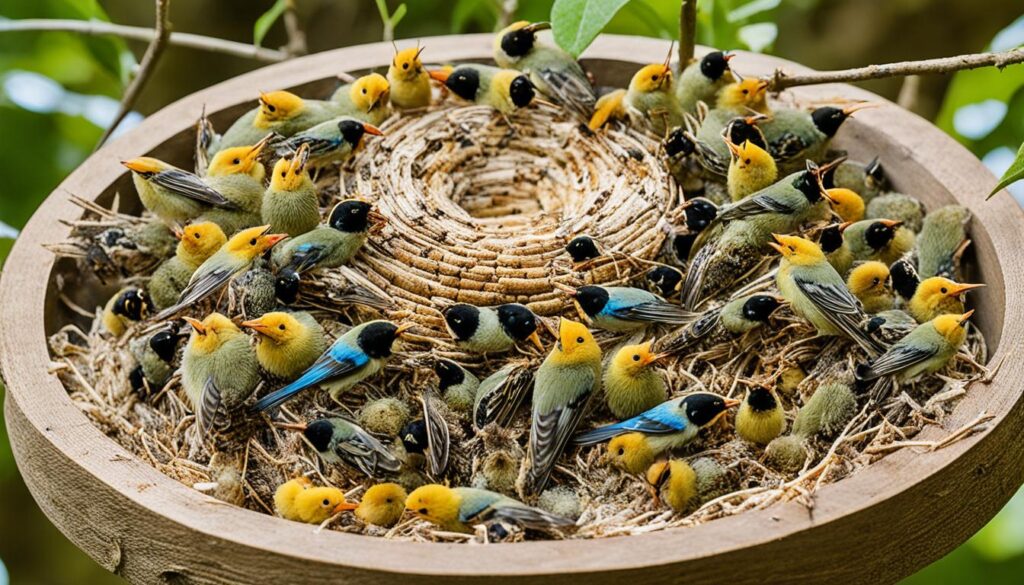
According to recent studies, up to 90% of bird species have specialized diets, with some consuming as much as 80% to 100% insects in their diet as nestlings. As birds mature, many expand their diet to incorporate a wider variety of foods.
Proper feeding techniques, such as preparing soft, bite-sized portions and using the appropriate feeding tools, are also essential for ensuring the health and well-being of baby birds. By providing the right species-specific diet and care, you can give these young birds the best start in life.
Transitioning to Independence
As baby birds grow and mature, they will gradually transition from relying on their parents or caregivers for food to becoming independent and foraging for their own meals. This weaning process can take several weeks, depending on the species. During this time, it’s important to slowly wean the baby bird off of the specialized diet and feeding techniques, encouraging them to develop the skills necessary to thrive on their own in the wild.
According to the data, weaning is a gradual process with no set timetable, and siblings within a clutch often wean at different times. Larger bird species generally take longer to wean compared to smaller species. Regular weight monitoring is crucial during the weaning process, as well-fed babies are more likely to explore and try new foods independently.
Weaning pellets are a popular choice for baby birds and are readily accepted due to resembling what parents feed chicks. The introduction of various soft foods like beans, rice, and fresh fruits and vegetables occurs when baby birds start transitioning to independent eating. These healthy food choices provide the necessary variety and stimulation to support the baby bird’s development.
Observing the chicks’ eating habits daily is vital to monitor their progress during weaning. Weaning regression may occur when birds move to a new home, necessitating additional nurturing and comfort feeding. It’s essential to provide a safe, controlled environment to ensure a successful transition to baby bird independence.
“Fledglings face an average mortality rate of 42% over a week or two after leaving the nest, and young fledglings have almost no skills initially, such as the ability to feed themselves or fly well.”
The fledgling period is complex and involves challenges related to rapidly acquiring necessary survival skills while being under parental care. An extra week of parental care can halve the mortality rate for fledglings, as the parents’ care can significantly increase their chances of survival.
Conclusion
Caring for baby birds is a delicate and crucial endeavor that requires a deep understanding of their unique dietary needs and specialized feeding techniques. By providing a diet rich in insects, worms, eggs, and specialized formula, and maintaining a safe, warm environment, caregivers can help ensure the healthy growth and development of orphaned or injured baby birds.
However, it’s important to recognize when professional assistance from a wildlife rehabilitation center is necessary to give the baby bird the best chance of survival and successful release back into the wild. Caring for baby birds involves navigating a range of challenges, from ensuring proper nutrition to creating a nurturing environment that supports their development.
Through a comprehensive approach to baby bird care, which includes understanding their natural feeding habits, providing suitable food options, and seeking expert guidance when needed, we can play a vital role in giving these vulnerable creatures the best possible start in life. By prioritizing the wellbeing of baby birds, we not only support the health of individual animals but also contribute to the overall conservation of our local avian populations.
FAQ
What do baby birds eat?
In the wild, baby birds’ diets consist primarily of insects, worms, and other protein-rich foods provided by their parents. As they mature, they may gradually incorporate more plant-based foods like seeds and berries.
How do I care for an orphaned or injured baby bird?
When caring for an orphaned or injured baby bird, it’s important to provide a diet that closely mimics what the bird would receive from its parents in the wild. This typically includes small insects, worms, eggs, and specially-formulated baby bird formula.
What are the signs that a baby bird needs help?
Signs that a baby bird requires help include obvious injuries, lethargy, or lack of parental care for an extended period. Fully feathered fledglings hopping around on their own are a normal part of their development and may not need assistance.
What foods should I avoid feeding baby birds?
Foods to avoid feeding baby birds include bread, potato chips, baked goods, honey, milk, and raw meat, as these provide little to no nutritional value and can even be harmful to their health.
How do I properly feed a baby bird?
Feeding baby birds requires a delicate touch and specific techniques. It’s important to make sure the food portions are soft and bite-sized, and to use tools like syringes, droppers, and tweezers to deliver the food gently and safely.
When should I seek professional help for a baby bird?
If a baby bird appears severely ill, injured, or is not thriving despite your best efforts, it’s crucial to contact a local wildlife rehabilitation center, as they have the expertise and resources to provide the necessary medical care and rehabilitation services.
Do different species of baby birds have different dietary needs?
Yes, the dietary needs of baby birds can vary significantly depending on their species. For example, songbirds often require a diet high in insects and worms, while baby pigeons and doves may do well on a diet consisting primarily of a mixture of instant baby oatmeal, powdered parrot food, and raw, beaten eggs.
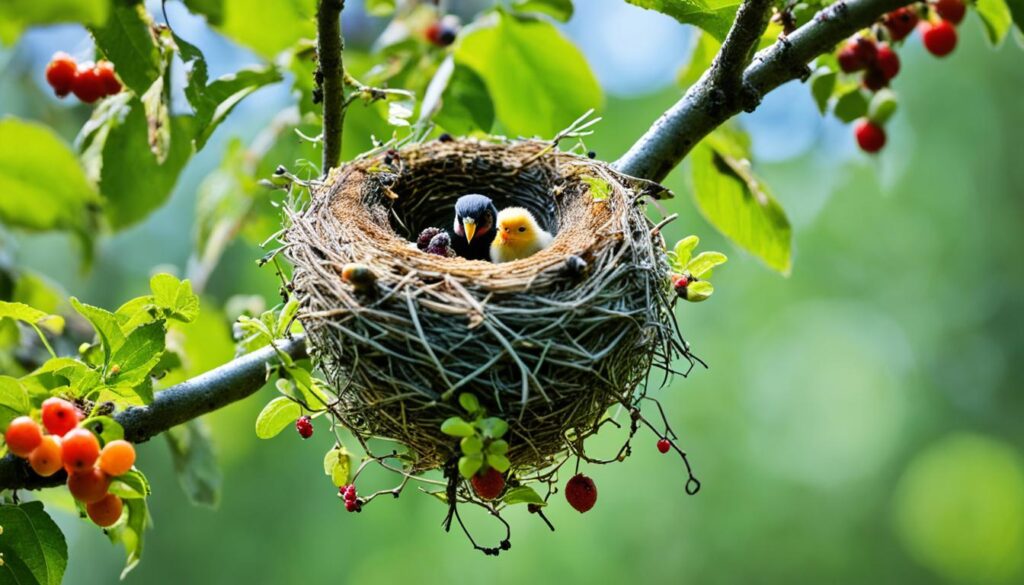
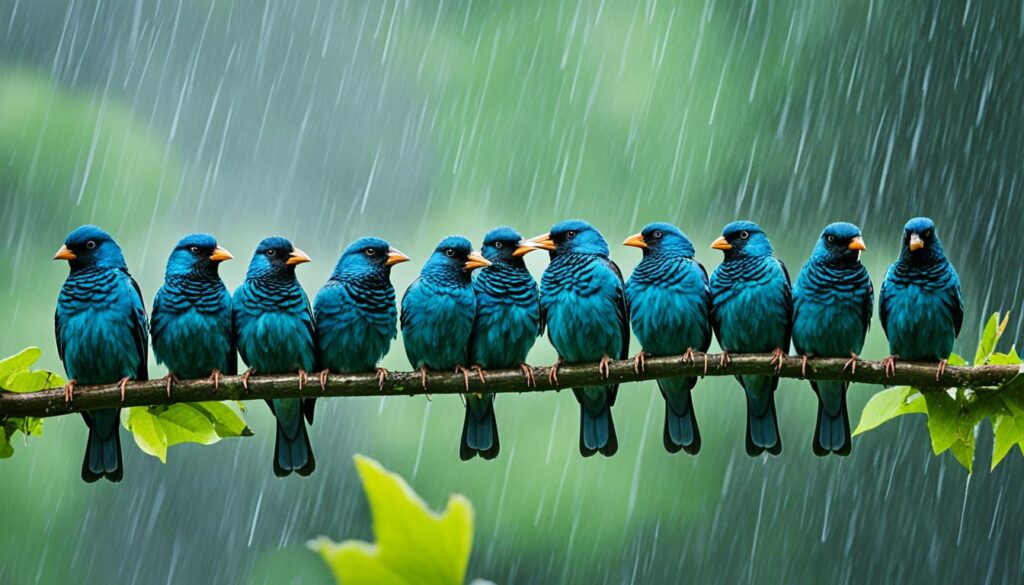
Muchas gracias. ?Como puedo iniciar sesion?
I’m extremely inspired along with your writing skills as neatly as with the format on your blog.
Is that this a paid topic or did you modify it yourself?
Either way keep up the excellent high quality writing, it is
rare to see a nice weblog like this one these days.
Youtube Algorithm!